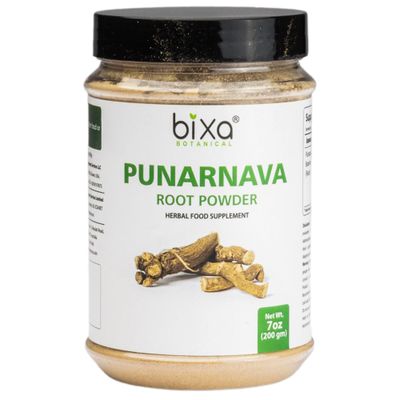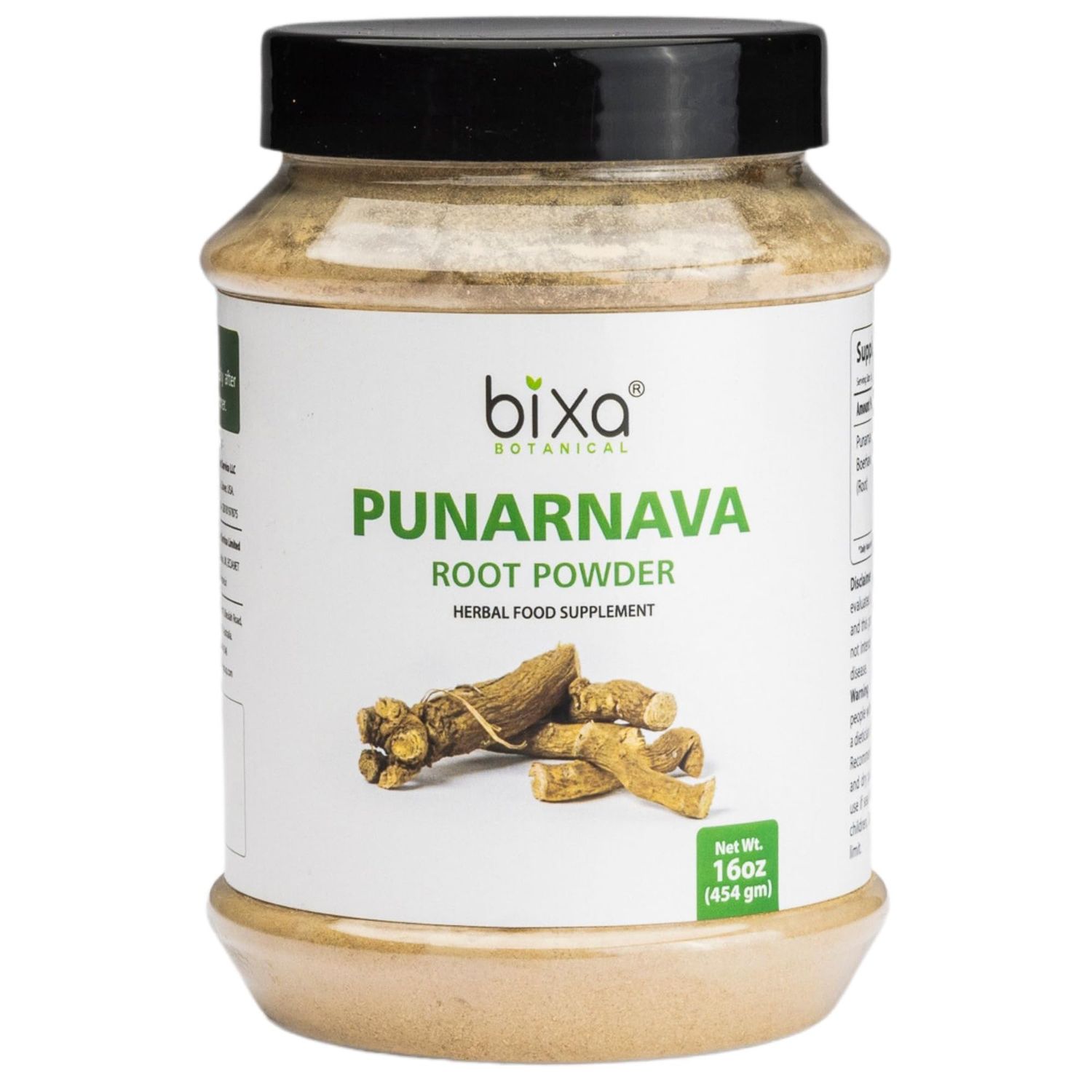bixa BOTANICAL Punarnava Powder | Boerhavia Diffusa | 1 Pound / 16 OZ | Ayurvedic Herbal Supplement | Gluten Free, Non-GMO, Steam Treated, Vegan, 100% Pure.
Description
Punarnava, commonly known as Hogweed (Boerhaavia diffusa), is a highly esteemed herb in Ayurveda, with a rich history of use for its rejuvenating and balancing properties. The name Punarnava in Sanskrit translates to "the one that renews," symbolizing its significance in revitalizing and restoring the body. It is referred to as "Shothagni," meaning "Oedema reducer," owing to its traditional role in managing excess fluid retention and swelling in the body. Punarnava is celebrated for its ability to balance the kapha and pitta doshas, the vital energies or "humors" in Ayurvedic philosophy, which govern various physiological functions. As an essential component in many traditional kapha-reducing formulas, it helps bring harmony to imbalanced states. Its ability to influence the body's natural processes has made it a go-to herb for promoting overall vitality and balance in Ayurvedic practices. The presence of important compounds, including nitrates of potassium and alkaloids, adds to its long-standing use in Ayurveda. Punarnava is mentioned in classical texts for its ability to promote healthy fluid balance in the body, especially in cases of fluid accumulation due to early liver imbalances or conditions like chronic peritonitis. It is often used in combination with other Ayurvedic herbs like ginger and vacha to support various natural processes within the body. Punarnava is also well-regarded for its ability to address imbalances that affect the body's overall heaviness or stagnation. Traditionally, it has been used to ease discomfort related to fluid retention and promote a sense of lightness and well-being. Its influence extends beyond fluid balance, as it is believed to aid in maintaining the integrity of the body's natural systems. This herb continues to be an important part of Ayurvedic wellness, highlighting its value in promoting balance and rejuvenation across different aspects of health.
Features
- WHY PUNARNAVA ROOT POWDER: Bixa Botanical Punarnava Root Powder is a valued herb in Ayurvedic tradition, celebrated for its rejuvenating and holistic wellness benefits. Sourced from the Boerhavia diffusa plant, this powder has been used in Ayurvedic formulations for centuries. Renowned for promoting balance and vitality, Punarnava is an excellent addition to daily wellness routines. Bixa Botanical prioritizes quality by preserving the herb's natural essence and potency. Its finely ground texture allows for versatile use in traditional applications, making it ideal for those looking to integrate ancient herbal remedies into modern wellness practices.
- HOW TO USE: Mix 2 teaspoons of the powder with 100 ml of boiling water. Stir well and remove from heat. Cover the mixture and let it sit for 6 hours. Strain the solution and consume the infusion on an empty stomach. OR Take to 1 tsp powder with cumin seed (jeera) water.
- STEAM TREATED FOR PURITY: At Bixa Botanical we prioritize your well-being with our premium quality products. Unlike harsh processes such as Radiation and ETO, we adhere to a "no use" policy. Our herbal powders and herbs are steam treated, a chemical-free method that removes impurities while preserving the natural integrity. This extends shelf life and meets international standards for quality and safety. The steam treatment may slightly alter the color or taste, a testament to our authentic products. Your safety and satisfaction are our top priorities.
- WHY BIXA : We are more than 147 years old Herbal Expertise Group , offering finest quality ingredients to craft our superior Herbal supplements, meticulously manufactured in a GMP-certified facility. Bixa Products are entirely pure and vegan, with Zero artificial flavors, colors, preservatives, fillers, additives, soy, or gluten. It is GMOs certified. It is sustainably sourced and nurtured with deep respect for all Ayurvedic principles, ensuring its integrity and potency. Choose Bixa for a natural, high-quality herbal supplement that honors the essence of Ayurveda.
- OUR PROMISE: More than a company, Bixa Botanical is a dream - to share the collective knowledge of five generations of a family with the world; secrets of Herbal Healing that have been painstakingly accumulated over the last 140+ years. More than 100 botanical products are offered to wellness-conscious and discerning consumers across the world, in the form of herbal powders, herbal extracts in vegetarian capsules, and Herbal tisanes.


